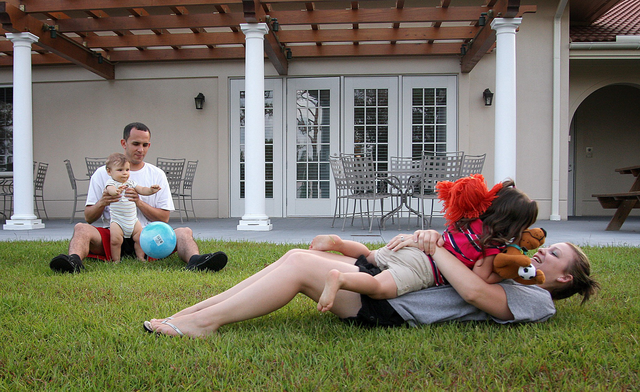Alice DeVoy lounged back on the grey overstuffed couch while CNN recounted the latest news on the large flatscreen TV in front of her.
The room she's in could be mistaken for any living room in America on a lazy afternoon, but DeVoy wasn't actually at home, she was within walking distance of her brother's hospital bed at the Tucson Veterans Affairs hospital.
DeVoy and her daughter Sherri Thomson came to Tucson from their home in Prescott Valley eight days earlier to keep an eye on her 67-year-old brother Harlan, who was scheduled for triple bypass heart surgery, and suffered a secondary collapsed lung, extending his hospital stay indefinitely.
They didn't know where they'd stay when they got to the hospital until staff referred them to the nearby Fisher House, which opened in March.
The Tucson house — the first in Arizona and among 71 worldwide — is open to loved ones of a veteran or active duty VA patient who live more than 50 miles from the hospital.
DeVoy fought back tears as she talked about the house staff and how welcoming everyone was to her and her daughter.
"It's been great here," DeVoy says. "I mean, they have laundry facilities, everything — and I couldn't ask for anything nicer or better."
House Manager Kelly Laurich takes pride in the level of service she and her staff offer residents of the 16-bedroom facility, which cost $6 million to build.
Laurich's goal is to make guests feel at home during their stay; they can accommodate up to 45 people and have had an occupancy rate averaging 78 percent over the first six months.
The homes are part of a private-public partnership between the Fisher House Foundation — which builds, furnishes and donates the homes — and the VA.
The foundation covers the majority of building costs for the projects, with fundraising by the community covering the rest.
For DeVoy and Thomson, feeling at home took the form of cooking 55 meals alongside Laurich so they could keep the refrigerator stocked for residents.
Just like home
Thomson loves that she and her mom can find a piece of home while also helping fellow guests.
"The cool thing about this place is that even after all the stress and worry about what's going on, you could still come here and relax," Thomson says. "If you're a person that likes to bake or cook when you're stressed, you bake or you cook. You get the chance to bake or cook for other people, so that they can feel better."
Cooking allowed them an escape from the crippling worry and fear that lurks when a loved one undergoes medical treatment.
"We can't visit because it's too much for him, so we had to leave him alone,” Thomson says. “And if we were in a hotel room we'd go nuts. And here, we have a chance to feel like it's home, that it's OK."
For other residents, like 29-year-old Army recruiter Andrea Means of Chandler, the home's amenities provide an invaluable service.
"My experience has been amazing," Means says. "My kids feel like they're at home. It's very spacious. It doesn't feel like we're crowded on top of each other here. It's helpful, because right now my husband, Terrill, and I are on a one-income basis because he can't work right now. So being here has helped us financially because we don't have to pay for a hotel."
Means had been at the house with her two children for six days as Terrill underwent surgery to remove his thymus.
She, like DeVoy, did not know of the facility until hospital staff informed her about it, and says she'll never forget the kindness and love she's received from Laurich and her staff.
"It has been amazing," she says. "The experience of being here, and the benefits of being right here, where I can literally walk to my husband is incredible."
Means says she's been telling all her friends and family about the facility, trying to get the word out so they can avoid the hassle and cost of taking care of a loved one.
"Words can't explain how grateful I am for Fisher House," Means says. "I honestly think it should be put out more into the community to let them know about it. I think everyone in the community should know about them, because as we all know our veterans should be taken care of."
Getting by, with help
All the amenities enjoyed by guests, from the soap in their bedrooms to the food in pantries and the refrigerator come via donation.
That's where local service organizations, like American Legion Post 131 in Green Valley and local fundraisers like Kristy Leonard and Marvol Barnard come in.
Laurich lauded the support the home's received. More than $2 million was raised in the community since 2015, to help cover the construction of the home.
"It's been incredible, because part of getting a Fisher House is that you have to have a fundraising committee," Laurich says. "We were the first house in the state, so they had to go out and raise that money, and then the VA would cover all the additional costs beyond what they raised. Our support was awesome. Our community and state are amazing toward veterans."
Leonard and Barnard are active in the post, and are tasked with spearheading the annual golf tournament, which has raised money for the home for two years.
Last year's event, which Leonard took on singlehandedly, raised $5,000, with this year's tournament set for Nov. 20 already bringing in $7,600 in donations.
Leonard wants to raise $10,000 for the home, and says the support she's received from the community has been incredible.
"When the Fisher House came out here and they got the OK to build it, our board essentially said, 'OK, why don't we change who were donating to?' Especially since they're local. Every penny of every dollar that you donate is going to them. It's 100 percent that's going back to the veterans."
Barnard, who was one of four teachers nationwide to win the LPGA's Teaching and Club Professionals National Award in 2016, tapped into her extensive network of golfers in Southern Arizona, trying to get as many to play in or donate to the tournament.
Barnard thinks the combination of her golf network and Leonard's ability to organize large-scale events should help them hit their monetary goal.
"We really have a two-pronged approach," Barnard says. "We wanted to make this a post-wide fundraiser, rather than having it be something where the golf tournament was solely responsible for raising all the money."
Hearing testimonials like DeVoy and Means', highlight how important the facility is to the community.
"For me, any time that I hear a story about someone who's up there I choke up," Leonard says. "Because I couldn't imagine being in a situation where my husband or my dad was at one of those facilities and I couldn't afford to stay there."
She's thrilled to have the opportunity to give back to those who serve, in whatever way that she can.
"We don't do enough as a country for our veterans, in my personal opinion," Leonard says. "And so anything we can give back to them is huge. So they realize how much support they actually have from the general populace. That we really support the sacrifices they made serving and protecting our country."















